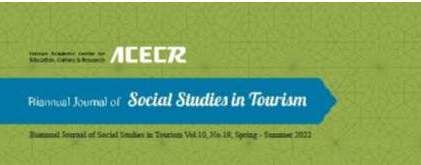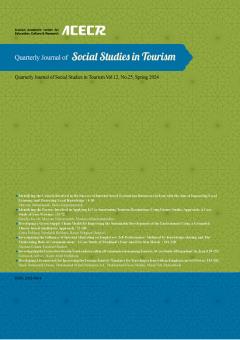Investigating the Influence of Internal Marketing on Employees' Job Performance Mediated by Knowledge-sharing and The Moderating Role of Communication: A Case Study of Mashhad’s Four and Five-Star Hotels
Subject Areas :Ghasem Eslami 1 * , Farshad Ghaderi 2
1 - Ferdosi University
2 -
Keywords: Human Resources, Knowledge Sharing, Internal Marketing, Employees’ Job Performance, Communication,
Abstract :
Today's social community pays great attention to human resources. In other words, the performance of employees in the service sector, especially the tourism industry, is becoming increasingly important. On the other hand, tourism industry employees contribute significantly to creating a competitive advantage, with organizations with better-performing employees experiencing better business growth. Therefore, this study sought to investigate the influence of internal marketing on the employees’ job performance mediated by knowledge sharing and the moderating role of communication. The current study is applied in terms of purpose and descriptive survey in terms of method. The statistical population of the study comprised the 390 employees of four and five-star hotels in Mashhad. The required data were collected from the administered questionnaires, which were then analyzed via structural equation modeling using the AMOS software. The findings of the study indicated that internal marketing exerted a positive significant influence on knowledge sharing and staff performance. Moreover, knowledge sharing was found to have a positive effect on employees' job performance. Furthermore, the positive effects of the moderating role of organizational communication and knowledge sharing were also confirmed. The present research is descriptive-survey in terms of applied purpose and method of work. The statistical population of the study includes the staff of hotels in Mashhad. The collected data from 390 questionnaires were analyzed by structural equation modeling with AMOS software. Findings showed that internal marketing has a positive and significant effect on knowledge sharing and employee performance. At the same time, knowledge sharing has a positive effect on employees' job performance. Another result was that the moderator role of organizational communication was also confirmed. In addition, the role of knowledge sharing interface was also confirmed.
رحیم¬نیا، فریبرز؛ قادری، فرشاد و اسلامی، قاسم. (1398). «بررسی تأثیر استراتژیهای رفتاری بر تمایل به ترک خدمت در کارکنان زن هتلهای شهر مشهد». برنامهریزی و توسعه گردشگری، 8 (30)، 1-15.
ضرغام بروجنی، حمید؛ عبدی، مرجان؛ محمود زاده، سید مجتبی و اصلی پور، حسین. (1400). «طراحی شبکه مضامین چالشهای توسعه گردشگری دینی در ج. ا. ایران». مطالعات اجتماعی گردشگری، 9(17 ), 51-82.
محمودی، سمیه؛ رنجبریان، بهرام و فتحی، سعید. (1394). «شناسایی عوامل مؤثر بر تصویر ذهنی گردشگران خارجی از ایران». فصلنامه برنامهریزی و توسعه گردشگری، 4، (13)، 92-72.
Berry, L. (1981). The employee as a customer. Journal of Retail Banking, 3(7), 25–80.
Boukis, A., Kaminakis, K., Siampos, A. and Kostopoulos, I. (2015). Linking internal marketing with customer outcomes, Marketing Intelligence & Planning, 33 (3), 394 -413.
Chang, C. C., Tseng, K. H., & Chen, C. W. (2019). The moderating role of online community participation in the relationship between internal marketing and organizational citizenship behavior, Social Behavior and Personality: An International Journal, 40(10), 1725–1738.
Chow, C. W., Lai, J. Y., & Loi, R. (2015). Motivation of travel agents' customer service behavior and organizational citizenship behavior: The role of leader-member exchange and internal marketing orientation. Tourism Management, 48, 362-369.
Cropanzano, R., & Mitchell, M. S. (2005). Social exchange theory: an interdisciplinary review. Journal of Management, 31(6), 874–900.
Frye, W. D., Kang, S., Huh, C., & Lee, M. J. M. (2020). What factors influence Generation Y’s employee retention in the hospitality industry?: An internal marketing approach. International Journal of Hospitality Management, 85, 102352.
Hameed, Z., Khan, I., Sheikh, Z., Islam, T., Rasheed, M., Naeem, R. (2019). Organizational justice and knowledge sharing behavior: The role of psychological ownership and perceived organizational support, Personnel Review, 48(3), 748-773.
Ioannidis, E., Varsakelis, N., & Antoniou, I. (2019). Change agents and internal communications in organizational networks. Physica A: Statistical Mechanics and its Applications, 528, 121385.
Iqbal, N., Ahmad, M., Allen, M. and Raziq, M. M. (2018). Does e-HRM improve labor productivity? A study of commercial bank workplaces in Pakistan, Employee Relations, 40(2), 281-297.
Guchait, P., Abbott, J. L., Lee, C. K., Back, K. J., & Manoharan, A. (2019). The influence of perceived forgiveness climate on service recovery performance: The mediating effect of psychological safety and organizational fairness. Journal of Hospitality and Tourism Management, 40, 94-102.
Kadic-Maglajlic, S., Boso, N., & Micevski, M. (2018). How internal marketing drive customer satisfaction in matured and maturing European markets? Journal of Business Research, 86, 291-299.
Kheirandish, M., Avilagh, H. A., & Nazemi, N. (2017). An empirical study of the pathology of organizational communications based on three branches model: A case study. Arab Economic and Business Journal, 12(2), 81-92.
Khoreva, V. and Wechtler, H. (2018). HR practices and employee performance: the mediating role of well-being, Employee Relations, 40(1), 227-243.
Kim, B., & Lee, J. (2016). Relationships between personal traits, emotional intelligence, internal marketing, service management, and customer orientation in Korean outpatient department nurses. Asian nursing research, 10(1), 18-24.
Kim, J., Song, H. J. and Lee, CH., (2016). Effects of corporate social responsibility and internal marketing on organizational commitment and turnover intentions, International Journal of Hospitality Management, 55, 25-32.
Li, J., Yuan, L., Ning, L. and Li-Ying, J. (2015). Knowledge sharing and affective commitment: the mediating role of psychological ownership, Journal of Knowledge Management, 19(6), 1146-1166.
Lyu, C., Yang, J., Zhang, F., Teo, T. S., & Mu, T. (2020). How do knowledge characteristics affect a firm’s knowledge-sharing intention in interfirm cooperation? An empirical study. Journal of Business Research, 115, 48-60.
Maloney, M., & McCarthy, A. (2017). Understanding pension communications at the organizational level: insights from bounded rationality theory & implications for HRM. Human Resource Management Review, 27(2), 338-352.
Ogunmokun, O. A., Eluwole, K. K., Avci, T., Lasisi, T. T., & Ikhide, J. E. (2020). Propensity to trust and knowledge sharing behavior: An evaluation of importance-performance analysis among Nigerian restaurant employees. Tourism Management Perspectives, 33, 100590.
Oliveira, M., Curado, C., & Henriques, P. L. (2019). Knowledge sharing among scientists: A causal configuration analysis. Journal of Business Research, 101, 777-782.
Park, J. H. and Tran, T. B. H. (2018). From internal marketing to customer perceived relationship quality: evidence of Vietnamese banking firms, Total Quality Management & Business Excellence, 31(7-8), 777-799.
Paul, J. And Sahadev, S., (2016). Service failure and problems: Internal marketing solutions for facing the future, Journal of Retailing and Consumer Services, 40, 304-311.
Peng, X., Lee, S., & Lu, Z. (2020). Employees' perceived job performance, organizational identification, and pro-environmental behaviors in the hotel industry. International Journal of Hospitality Management, 90, 102632.
Rhoades, L., & Eisenberger, R. (2002). Perceived organizational support: a review of the literature. Journal of Applied Psychology, 87(4), 698–714.
Rich, B. L.; Lepine, J. A.; Crawford, E. R. (2010). “Job Engagement: Antecedents and Effects on Job Performance. Academy of Management Journal, 53(3), 617–635.
Shahzad, K.,Rehman, K. U., & Abbas, M. (2010). HR practices and leadership styles as predictors of employee attitude and behavior: evidence from Pakistan. European Journal of Social Science, 14(3), 417-426.
Sohail, M. Sadiq. And Jang, J. (2017). Understanding the relationships among
Internal Marketing Practices, Job Satisfaction, Service Quality, and Customer Satisfaction: An Empirical Investigation of Saudi Arabia’s Service Employees, International Journal of Tourism Sciences, 17(2), 67-85
Swanson, E., Kim, S., Lee, S. M., Yang, J. J., & Lee, Y. K. (2020). The effect of leader competencies on knowledge sharing and job performance: Social capital theory. Journal of Hospitality and Tourism Management, 42, 88-96.
Tang, A. D, Chang, M. & Cheng, ch. (2017): Enhancing knowledge sharing from self-initiated expatriates in Vietnam: the role of internal marketing and work-role adjustment in an emerging economy, Asia Pacific Business Review, 23(5), 677-696.
Tang, A. D., Chang, M. L., Wang, T. H., & Lai, C. H. (2020). How to create genuine happiness for flight attendants: Effects of internal marketing and work-family interface. Journal of Air Transport Management, 87, 101860.
Toth, E. L., & Trujillo, N. (1987). Reinventing corporate communications. Public Relations Review, 13(4), 42-53.
Terwel, B. W., Harinck, F., Ellemers, N., & Daamen, D. D. (2009). How organizational motives and communications affect public trust in organizations: The case of carbon dioxide capture and storage. Journal of Environmental Psychology, 29(2), 290-299.
Van Den Hooff, B., & De Ridder, J. A. (2004). Knowledge sharing in context: the influence of organizational commitment, communication climate, and CMC use on knowledge sharing. Journal of knowledge management. 62(2), 34-46.
Yang, Jen-Te. (2015). Effect of internal marketing on knowledge sharing and organizational effectiveness in the hotel industry. Total Quality Management and Business Excellence, 26(1-2), 76 –92.
Zhang, X., Liu, S., Deng, Z., & Chen, X. (2017). Knowledge sharing motivations in online health communities: A comparative study of health professionals and normal users. Computers in Human Behavior, 75, 797-810.

